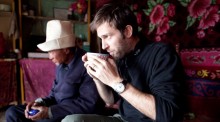By David Wang
As an award-winning documentary photographer based in Shanghai, Ryan Pyle is a regular contributor to The New York Times, Time Magazine, the Wall Street Journal, Fortune, Forbes, and other prominent media publications. But in 2011, Ryan, along with his brother Colin, also set a Guinness World Record for their circumnavigation of China – the longest journey by motorcycle in a single country.
I first met Ryan in Shanghai, while taking a Woodsworth College Summer Abroad course on Chinese politics taught by Asian Institute Director Joseph Wong. Ryan took us on a walking tour through the varied landscapes of Shanghai, from the old, traditional hutong housing to the new, glitzy shopping district of Xintiandi, giving us a peek into China’s recent urban transformation. As we experienced China on a new level, outside of the classroom, Ryan’s story of graduating from the University of Toronto and travelling to China to start his career also resonated with us. Upon hearing he was coming back to Toronto for an event at the Asian Institute, I had the chance to ask him a few questions about what he’s been up to over the last few years.
David Wang: Having photographed for famous media outlets such as the New York Times, Time, and Newsweek, how did you first get started in photography to make it to where you are now?
Ryan Pyle: I started off working for local English language magazines in Shanghai, and slowly graduated up the food chain to in-flight magazines and then eventually to major news magazines. It was a brilliant way to start and pursue my career. These days I am mainly focused on producing books about long-term and in-depth subjects like the region of Xinjiang (being published in September).
DW: You call yourself an “anthropologist with a camera” and not a photojournalist. How do you differentiate yourself from other photographers based in China?
RP: There are a lot of wonderful photographers in China, and I don’t really see how my work is different from theirs; but my focus is time and depth. Anyone who looks at a subject or a people for multiple years goes beyond what most photographers or photojournalists accomplish. The goal is to add depth, not noise, to the conversation. Because I’ve lived in China and documented China for a very long time, it does separate my work from others based only on the “kinds of stories” or the “depth” with which I investigate.
DW: What made you embark on producing and filming The Middle Kingdom Ride, and later The India Ride? What are some other future directions you are looking towards?
RP: I am interested in pursuing television as a way of reaching a wider audience with my ideas, interpretations, and my photography. I am going to continue to do further motorcycle rides because it is a wonderful way to explore the world and I am very lucky to have this opportunity. I’ll continue with mountain adventures as well because I enjoy the photographic element and the concept of pursuing physical challenges against Nature. Beyond those two genres, I am open to new ideas. I am doing a show with Discovery Channel this year which looks at a historical element of central China, again, a chance to increase my own knowledge base and share that with a wider audience.
DW: Having worked in both photography and film, how do these two mediums affect your approach differently?
RP: They are vastly different. But one must be careful in comparing these two. At this stage I work in photography by photographing other people, and I’ve worked in film only by putting myself on camera. So, it would be wrong to list me along with filmmakers or documentary filmmakers who deliver in-depth views on important subjects. I thoroughly enjoy being both behind the lens and in front of it as they both require entirely different approaches to the subject matter.
DW: How have you changed as a person after spending much of your professional career and life in China now?
RP: I’ve changed a lot. My entire perception of work and life has changed. These have changed based on the new perceptions about how the world operates and how competitive life is outside of Canada. After growing up at Avenue Road and Lawrence, living abroad for more than a decade in the world’s most populous country gives you new breath in to concepts like competition, education, work, life, sacrifice, development, and progress.
DW: What advice would you give university students and recent graduates looking to pursue a career in Asia?
RP: Challenge yourself on a daily basis. If life gets too comfortable, you aren’t pushing yourself hard enough. Challenge yourself by living abroad, working abroad, and fully embedding yourself and understanding the nature of life and work and reality in Asia. Coming for a few weeks here and there is not enough. Add depth, not noise.
Ryan Pyle will be coming to Toronto for a screening and discussion of his film The Middle Kingdom Ride on Saturday, March 29, 2014,at Innis Town Hall. For more details and to register, please visit: https://munkschool.utoronto.ca/ai/event/15927/.
For more on Ryan Pyle: www.ryanpyle.com
David Wang is a fourth-year student in the Dr. David Chu Program in Asia-Pacific Studies.
